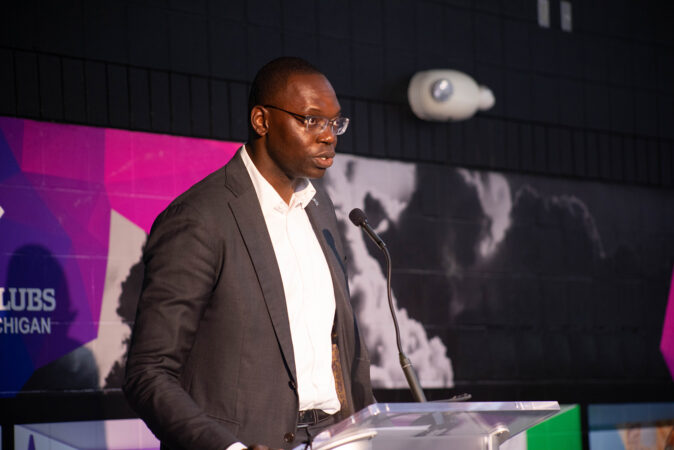Garlin Gilchrist is Gretchen Whitmer’s running mate for governor. Thus, Lieutenant Governor. Democratic ticket. He lives in Corktown, Detroit with his wife and twins and currently holds the title of executive director of the Center for Social Media Responsibility at the University of Michigan.
He was the first executive director of the City of Detroit’s Innovation & Emerging Technology department.
In 2017, he ran for Detroit City Clerk and lost by a very, very narrow margin.
He is the type of person—a computer engineer—who schedules his life in 20 minute increments. This interview took place on the telephone between 9:10 and 9:19am EST, exactly. As a testament to his quick mind and excellent communications skills, we cover his childhood, career history and platform for office.
Which is to say Garlin Gilchrist says more in 19 minutes than most people say in hours.
CV Henriette: You got into technology at an early age. How has this path shaped you as a person?
Garlin Gilchrist: I have my grandma, Doris, to thank for buying me a computer when I was five years old to make me the first kid on my block, on the East Side of Detroit, to have a computer. It opened me up to this world of problem solving and possibility. It was the first thing I ever took apart and put back together.
It was something that enabled me to be confident in how to control technology, and so, throughout the rest of my life, whether it was my education as a computer engineer, then as a computer scientist, and later as a software developer, all the way through my work as a community organizer utilizing technology, and then through working for the City of Detroit as the Director of Innovation and Emerging Technology—I see tech as a tool people can use to make life better. I want to make systems always work for people. Technology has always been part of what I use to solve problems because, ultimately, we solve problems to make life better, and that’s what tech can enable if used in the right way.
CVh: Do ever imagine how your life would have been had you not gotten that first computer? Do you ever imagine an alternative route?
GG: It’s funny—I never thought about that. Maybe because it was so early in life. I don’t know what the world would have looked like without it. I do think about what it could have looked like had I had a different relationship with that computer. If I would have seen it as a toy and not something to take seriously. Maybe I would have gone on a different path in life.
I certainly hope that one thing we can do, going forward, in the State of Michigan, is to make sure children have exposure to all types of possibility and opportunity. Not just technology but art and writing and different sorts of pursuits, so they can choose their own paths. Just as I was introduced to technology, I’m sure there was a young person who was introduced to singing at a young age and now they’re leading a mass choir somewhere.
We need to make sure children see all these different paths and can be whatever they want to be and have that available to them.
CVh: You’ve been very successful. What are some of the support systems you’ve had throughout? What’s been the motivating factor in your life? Maybe some you’d like to impart on other children.
GG: I have definitely benefited from having a supportive family, from my parents through my extended family. I’ve also been a beneficiary of numerous programs—basketball camps and leagues that I participated in as a child all throughout the metropolitan Detroit area. I played Detroit Pal Basketball. I played in the Junior Basketball League of Detroit. I played on a church team. Basketball really introduced me to a lot of people and took me to a lot of different places.
I was also a beneficiary of a program called the Detroit Area Pre-College Engineering Program or DACPEP, and that’s what introduced me to the profession of engineering. That’s a program that is less accessible today than it was when I was a child. That used to be a free program, and now it costs at least $25 to participate, and that’s a barrier we need to tear down, so kids can have access to the sort of exposure opportunity that I had. It took me to places like the headquarters of Chrysler in Auburn Hills, the headquarters of Ford in Dearborn, and the Upper Peninsula to Michigan Tech University when I was in high school. Those exposure opportunities are important, and that was a core part of the infrastructure that enabled me to become who I am today.
CVh: In your position as the City of Detroit’s first ever Director of Innovation & Emerging Technology, what did you learn about Detroit and its people? Specifically, the intersection between technology and politics.
GG: My job wasn’t political when I was working for the city. My job was to restore trust in the city government because the city government had, for numerous reasons, lost that trust over a generation. What I saw was an opportunity: there were problems to be solved whether that was increasing trust in the government by increasing transparency of the government which lead me to write the city’s open date and transparency policy and implement that program, so people could see what the government is doing. The lesson: people don’t trust what they can’t see.
People didn’t have clear insight into the government from an operational perspective, and so by writing that policy and implementing that program, we were able to open-up the books of the government, so to speak, and that lead to a healthier relationship between residents of the City of Detroit, the government, and the public servants who are here to serve them.
The other piece is people want to feel like when you interact with a system that it’s going to interact and respond to you. My second day on the job we had a huge rain storm, the second week of August 2014. On that third day, when we got to work, we were trying to answer some basic questions like “Who does a person call of this rainstorm causes a tree to fall on their car or on their house?” And so I helped prototype a program that enabled people—via email or text message or phone call—to report these fallen trees, so that a city inspector could come take a look at it.
That laid the foundation for a program that, ultimately, became Improve Detroit, which enables people to make non-emergency service requests and have those requests responded to in a trustworthy and timely manner. Things like a clogged storm drain or a dead or diseased tree—all sorts of issues: broken street lights, broken traffic signals. People want to know if they’re going to make a request of their government that it’s going to respond to them. And we need that kind of systems thinking and systems building at the level of the state as well.
These kinds of lessons taught me that people in Detroit are just like people everywhere else. They want to be able to trust the institutions that our tax dollars pay for. And I believe my training prepared me to serve people in that way.
CVh: What’s changed since your 2017 bid for City Clerk?
GG: It was tremendous experience, and I’m thankful and humbled that people supported me as a first-time candidate stepping into the political realm and working hard to earn their trust and support. I certainly want to thank everyone who helped me in that endeavor.
I learned that people vote for people, that people want to see that the person who is asking for their vote is genuine and earnest and wants to work hard and do a good job—that they’re a good listener, who’s going to be able to recognize what people are saying and what they’re implying, even if they’re not saying something, that that person is going to do their best not only to represent them, but to help them address the problems that they identify.
That was the chord I tried to strike on my City Clerk run, and I think it’s the same chord that Gretchen Whitmer and I are striking as we campaign across the State of Michigan.
We’re trying to meet people wherever they are, listen to the things they value the most and help them work together with us to find solutions to those challenges. People voting for people is one thing.
The second thing: it’s important not to leave any potential voter untouched. We need to have conversations with as broad a set of people as possible. That includes engaging and conversing with people who may not look like your typical voters. I tried to do that on my City Clerk campaign, and we’re doing that in a big way, up and down the ticket, as Democrats this cycle, and I think we’re going to see historic voter turnout because we’re connecting with people in a whole different way.
CVh: What does a Lieutenant Governor do, and why are you excited and qualified to do it?
GG: You can think about it in general as the relationship the Vice President has to the President—It’s the same relationship the Lieutenant Governor has to the Governor. When the Governor is out of the State or otherwise, heaven forbid, incapacitated, the Lieutenant Governor serves as the Governor of Michigan.
The Lieutenant Governor presides over the State Senate in the same way the Vice President presides over the State Senate. One of the responsibilities of that is if there’s a tie, in terms of the vote in that body, the Lieutenant Governor will cast a tie breaking vote.
Other things, broadly speaking—the Lieutenant Governor is the Governor’s partner to advance an agenda that they both believe is the best way to take the State of Michigan forward. Gretchen Whitmer and I offer a unique combination of experiences and skillsets. Hers as a masterful negotiator and lawmaker, and a person who has fought hard fights for our values and is deliberate on big things like healthcare, expanding access to Medicaid program to more than 680,000 people in the State of Michigan.
She’s shown that she knows how to make laws, make things happen regardless of she’s in the minority party or not. My experience is as a system’s builder, an engineer, a person who knows how to make systems work for people and how to fix broken systems. My experience as a community organizer makes me someone who knows how to mobilize and energize people. We believe that that combination can help us move a big, bold agenda forward when it comes to ensuring that every child has access to a high-quality public-school education; that every family has access to a pre-k education program for their children; that everyone, including the 600,000 people in Michigan who don’t have healthcare, can get access to healthcare; that we can connect our communities via stronger, safer and supportive transit systems; that everyone in Michigan has access to the Internet; that we can provide kids with those exposure opportunities to highway skills and jobs like the exposure opportunities I had when I was a child.
We believe these things are possible and we’re going to use everything in our disposal to get them.
CVh: What do you most hope to achieve during your term?
GG: I’m a parent of young children. My wife and I have a five-year-old twin son and daughter, who just started kindergarten. We brought our children home to the city when they were ten months old to raise them in Detroit, Michigan because we thought that was the best place to lay the foundation for their future.
This work, this campaign, this opportunity to govern is about what can we do to lay that foundation for not only my children, but children all across Michigan, and that’s really exciting to me.
CVh: Anything else?
GG: I want people to regain confidence in the State of Michigan and in the way that the government can be a helper and recourse to people. That confidence has been lost. We’ve had infrastructure failure and broken promises. We need to reset that. If Gretchen Whitmer and I can make it clear that we are here to be supportive of people’s dreams, to enable people’s imagination and work with them, so that they can be whatever they want to be in Michigan—that they start to feel that regardless of their station in life or how much money they make.
We will have been successful as leaders if we have both resilience and confidence restored to how people feel about the State of Michigan.
CVh: What’s something most people don’t know about you?
GG: I bike a lot. My kids are getting pretty big now, but we used bike with them everywhere in a bike trailer together. Including riding from our place in Corktown to and from the Zoo, which was a fun bike ride. I’m into biking and transit very heavily.
Voting is Tuesday, November 6th. If you’re eligible to vote, vote.





















